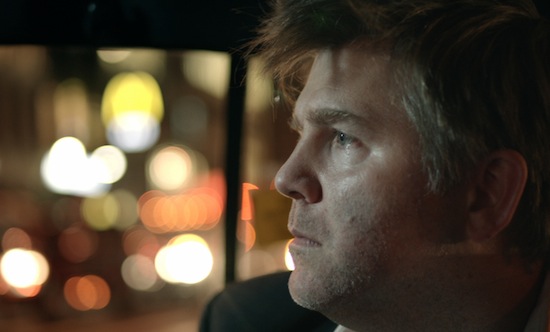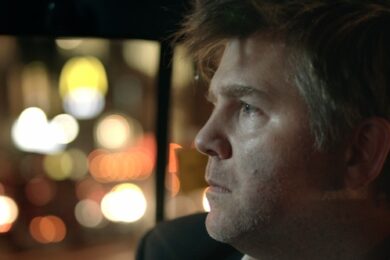Burn out, lose fans or face an eternity of comebacks and reunion tours. The three main options faced by all bands slipping past their prime. LCD Soundsystem’s premeditated end, however, offered another way out. With three Grammys to his name, James Murphy, then 41 years old, dissolved his idolised punk-funk ensemble at the height of their powers in April 2011 – but not before playing one last show at Madison Square Gardens. It sold out in 15 minutes, with touts flogging tickets for upwards of $1,500. The feature-length Shut Up and Play the Hits captures this final gig, interspersing its best moments with Murphy in his apartment the following day, petting his Boston terrier, wandering around in his pants.
The documentary, by filmmakers Dylan Southern and Will Lovelace, may be a tad reverential at times but is gorgeously shot and an intelligent take on the standard ‘live DVD’ format. The visceral live scenes have some truly awe-inspiring moments, while the interesting (albeit goatee-strokingly pretentious) interview of Murphy by the American pop culture essayist Chuck Klosterman, offers some insight into how Murphy regards both himself and the industry. Watching the film, it is hard to reconcile Murphy’s everyman, slightly morose daytime persona with concert footage of him amid crying fans, falling balloons and a band of NYC hipsters holding court in such an iconic arena. The LCD frontman’s strangely controlled withdrawal does risk being branded contrived, but it has its advantages, not least giving him the chance to secure and craft a legacy.
What the film doesn’t explore so much is the band’s origins. It’s a good tale of a seemingly unremarkable late-starter eventually finding his path. Murphy, approaching the dreaded 30-year-old threshold, found himself in an unhappy relationship, unemployed and lacking musical success. Round 2001, however, he and a couple of friends founded label Death From Above, later becoming DFA Records. Their first hit was The Rapture’s ‘House of Jealous Lovers’ and dance punk was spawned. Murphy’s own brilliant, sobering track ‘Losing My Edge’ followed, and from there LCD Soundsystem grew into the cult wonder that could sell out Madison Square Gardens in minutes.
The Quietus caught up with Murphy at the film’s premiere, to talk gunslingers, Jackson Pollock and the odds of him becoming a rapping neuroscientist.
How are you feeling right now? It must be strange to be standing on your own red carpet.
James Murphy: It’s pretty weird, to be honest. I’ll be better when I have a couple of drinks. Otherwise, pretty weird – but good too. This has been in the pipeline now since before the show in April; in fact, it’s been over two years in the making.
What was the original impetus to do this film? It’s quite an unusual move to quit and make a film round that.
JM: I don’t think it’s that strange. If people knew when their last show was, they’d all film it and call it ‘The Last Show’. But bands just don’t tend to know it. The original film, though, wasn’t going to be about the last show at all. We were originally approached to film a documentary about the band and ourselves. But then I said on the internet ‘we quit’ and they were like, ‘well, why don’t we film that?’ There you go – bingo! It’s like you want to do a film about a gunslinger and then he just shoots himself. And you’re like, ‘okay, cool. Let’s just film that’.
What’s next for you? What projects do you have in mind?
JM: I honestly have no idea. That’s what’s fun about it. If I hadn’t quit the band, then I would be able to tell you what’s next is me releasing another record, going on fucking tour, making a video that I don’t want to make. But now, I’m like, ‘I don’t know’. Well, it’s not a totally blank canvas – I’m not going to be a neuroscientist.
I can just do what I feel like. It’s terrifying but liberating. It’s a great feeling not knowing what’s going to happen with my work. I feel pretty good about it.
Do you have any inkling at all what direction your future music might take?
JM: I don’t really understand musical genres too much. I’m always going to be ‘me’ though – I’m not suddenly going to start making classical music or jazz. I won’t start rapping – I’ll spare the world that.
Have you considered any collaborations now you’re a free agent?
JM: I’m not a good collaborator. The way I work is that I might make stuff with friends if I feel like it. But I’m not that guy who collaborates, I’m not so great at that. I always think I’d hurt someone’s feelings so I work alone. I mean, if I don’t like what they’re doing, what do you do? I don’t like what I’m doing most of the time – at least I don’t have to talk to myself about it.
Are you an intense creative type when you’re writing music?
JM: Well, I think I’m pretty workmanly – other people might disagree but I just get on with it. I coast at a fairly nominal level – low-grade depression, pretty much – but then I get excited when I’m working on the music and that’s how it works. Though it’s not like at a Jackson Pollock level – I don’t go peeing into flowerpots. You lose friends that way.



